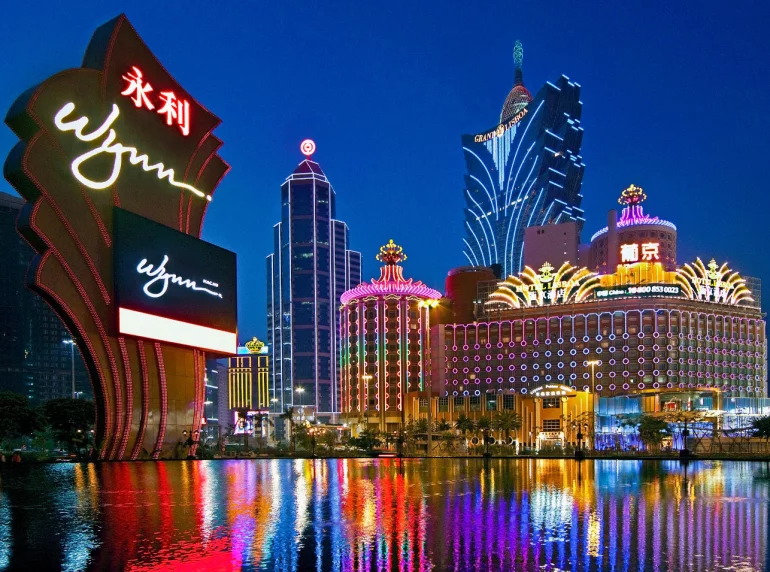The former Portuguese colony of Macau has undergone a remarkable transformation over the last two decades. From a city with a single gambling monopoly, it has risen to become the world's largest gaming hub, far surpassing even the Las Vegas Strip.
This article from Casinoz will trace the modern history of the Macau gambling industry, examining the key milestones that fueled its explosive growth and the recent challenges that have prompted a shift toward a more diversified and sustainable future. Understanding this journey is essential to appreciating the unique position of Macau in the global gambling world.

The End of the Monopoly
The Pre-2002 Era
For decades, the Macau gambling industry was dominated by a single entity: the Sociedade de Turismo e Diversões de Macau (STDM), a company led by the legendary Stanley Ho. Under this long-standing monopoly, Macau established its foundational infrastructure and reputation as a gambling destination for patrons, primarily from Hong Kong.
While this period laid the groundwork for future success, it also limited the city's potential for growth and innovation. The era was characterized by a specific business model that would soon be upended by a pivotal government decision.
The Liberalization of the Market
The turning point came in 2002 when the Macau government, seeking to boost the economy and increase tax revenue, ended the STDM monopoly. It issued new gambling concessions to a handful of operators, including major international players like Las Vegas Sands and Wynn Resorts. This strategic move opened the floodgates for billions of dollars in foreign investment and sparked fierce competition.
The influx of new capital and expertise led to a period of unprecedented casino construction and expansion, fundamentally changing the character of the Macau gambling scene and setting the stage for its dramatic rise.
The Golden Age of Growth
The Rise of the VIP Segment
With new casino operators came the era of opulent, integrated resorts. These massive complexes, offering not only gambling but also luxury hotels, high-end shopping, and fine dining, were designed to attract a more affluent clientele. The VIP segment, in particular, became the engine of growth for the Macau casino industry.
This segment was largely driven by "junket" operators, who specialized in bringing high-rollers from mainland China to Macau. For years, these VIP players accounted for the vast majority of Macau's gross gaming revenue, making the city a magnet for wealthy gamblers.
Overtaking Las Vegas
The sheer scale of the Macau gambling industry's expansion and its success in attracting high-stakes players meant that its revenues grew at a staggering pace. In 2007, Macau's gross gaming revenue surpassed that of the Las Vegas Strip, solidifying its new identity as the world's top gaming hub.
This achievement was a clear signal of the city's dominance and its central role in the global gambling market, a position it would hold for years to come. The market was booming, and the city's economy was thriving on the back of its gambling-driven growth.
Shifts and New Challenges
The Impact of Chinese Government Policy
The golden age began to face headwinds around 2014, when the Chinese government launched a nationwide anti-corruption campaign. This initiative had a direct and significant impact on Macau's VIP segment, as many high-rollers from the mainland became reluctant to travel to the city for fear of drawing government scrutiny.
As a result, casino revenues plummeted, leading to a major downturn for the industry. This period marked a crucial shift, as the Macau government began to actively promote economic diversification, urging operators to reduce their reliance on gambling.
The COVID-19 Pandemic
The next major shock to the Macau gambling industry was the COVID-19 pandemic. The city's reliance on tourism meant that when travel restrictions were imposed, casino revenues came to a near-complete halt. The industry experienced a historic downturn, with empty resorts and a massive drop in gross gaming revenue.
The pandemic exposed the vulnerability of an economy that was so heavily dependent on a single sector and highlighted the urgent need for a more resilient and balanced economic model.
The New Gaming Law
In response to these challenges, Macau's government enacted a new gaming law in 2023. This legislation introduced major changes designed to tighten regulatory control and promote sustainable growth. It placed stricter oversight on casino operators, significantly limited the influence of junket businesses, and formalized the government's push for economic diversification.
The new gaming law also included a greater emphasis on social responsibility, ensuring that the Macau casino industry contributes more broadly to the local community.
The Path Forward
The Mass Market and Diversification
With the decline of the VIP segment and new regulatory mandates in place, the Macau gambling industry is now strategically shifting its focus. Operators are heavily targeting the mass market and premium mass segments, which consist of tourists and casual gamblers rather than high-rollers.
Additionally, there is a strong emphasis on diversifying away from gambling by investing in non-gaming attractions. New regulations are encouraging casino operators to develop more retail, entertainment, and conference facilities to attract a wider and more varied audience, securing a more stable visitor base.
A Resilient Economy
Today, the Macau gambling industry is in a state of recovery and profound transformation. While the market is slowly rebounding from the effects of the pandemic and the anti-corruption campaign, it is doing so with a new, more resilient foundation. The concerted effort toward economic diversification and stricter regulatory compliance is paving the way for a more stable and sustainable future.
| Casino | Bonuses | Editors rating | |||
| 100% to 150 $ x45 |
Play
T&C applies, 18+
|
||||
| — |
Play
T&C applies, 18+
|
||||
| — |
Play
T&C applies, 18+
|
||||
| 100% to 400 $ x50 |
Play
T&C applies, 18+
|
||||
| — |
Play
T&C applies, 18+
|
This new approach aims to ensure that Macau remains a global tourism and entertainment center, not just the world's gambling capital.














